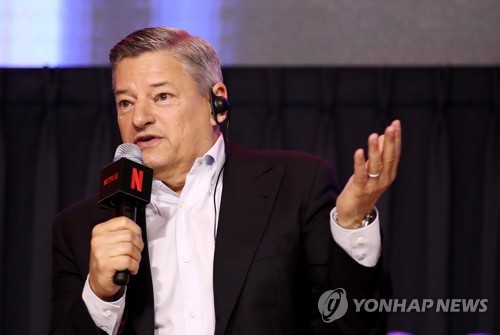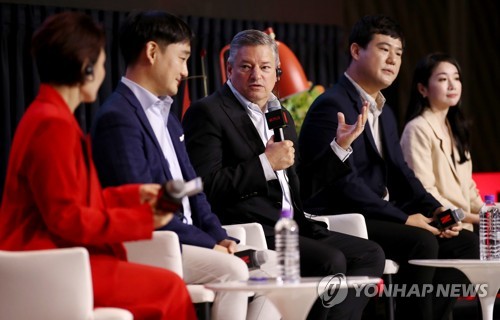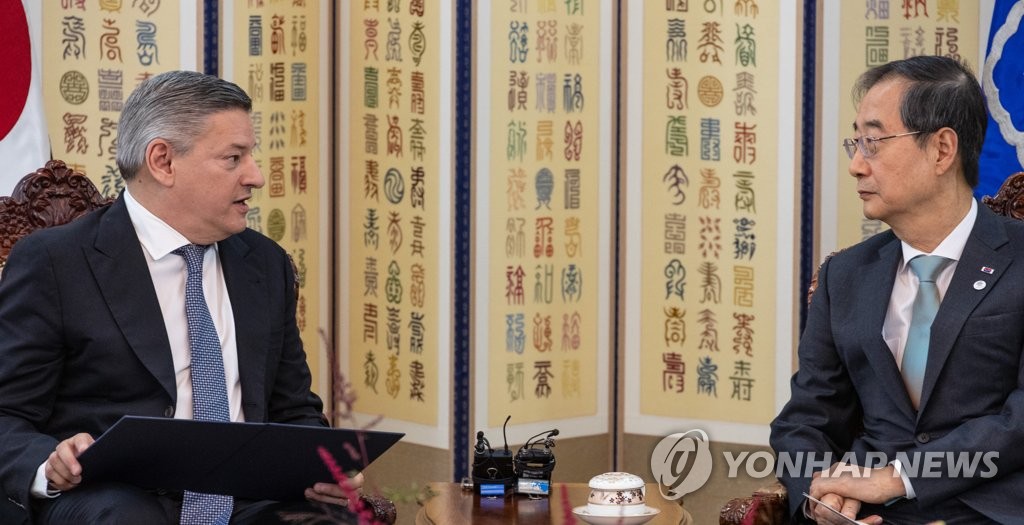- California Assembly OKs highest minimum wage in nation
- S. Korea unveils first graphic cigarette warnings
- US joins with South Korea, Japan in bid to deter North Korea
- LPGA golfer Chun In-gee finally back in action
- S. Korea won’t be top seed in final World Cup qualification round
- US men’s soccer misses 2nd straight Olympics
- US back on track in qualifying with 4-0 win over Guatemala
- High-intensity workout injuries spawn cottage industry
- CDC expands range of Zika mosquitoes into parts of Northeast
- Who knew? ‘The Walking Dead’ is helping families connect
Netflix’s unwavering conviction on power of stories proven in Korea: co-CEO Ted Sarandos
Netflix co-CEO Ted Sarandos said Thursday his company’s unwavering belief in the power of exceptional content from all corners of the globe to captivate audiences worldwide has been proved in South Korea.
Sarandos proudly disclosed the global streaming giant’s alternative approach defying conventional expectations during a media event organized by Netflix at a hotel in central Seoul.
“Back then everyone assumed we’d follow the traditional Hollywood playbook — exporting American movies and series to the rest of the world. But we’ve followed a different path,” he said.
Netflix has invested in original, authentic local stories in over 50 countries since its global launch in 2016 because it believes that “Great stories can come from anywhere and be loved anywhere,” according to Sarandos.
“Nowhere has this proven more true than here in Korea,” he emphasized.

A staggering 60 percent of Netflix subscribers have now watched at least one Korean title, with viewing of Korean content up sixfold globally in the last four years, he said.
Mentioning the genre of romance as an example, he also said 90 percent of Korean romance viewing now comes from outside the country.
“And last year, our Korean movie ‘Carter’ and two TV shows — ‘All of Us Are Dead’ and ‘The Glory’ — hit the Netflix Top 10 in over 90 countries. Of course, nothing quite beats ‘Squid Game,’ the biggest TV show in history on any metric we’ve ever seen,” he explained.
In April, Netflix announced it will invest US$2.5 billion in South Korea over the next four years to produce Korean TV series, movies and scripted shows after a meeting between South Korean President Yoon Suk Yeol and Sarandos during Yoon’s state visit to the United States. The amount is roughly twice as much as the company has invested since it first launched its service in Korea in 2016.
When asked to disclose details of the investment plan Thursday, Sarandos said the investment includes funding for training programs for the next generation of creators in front of and behind the camera.
“Between 2022 and 2025, for example, 1 in 5 Netflix titles in Korea will have come from a first time writer or director,” he added.
Netflix will make content loved by Korean viewers, most of all, because it believes success in Korea will lead to success in the global market, he stressed.

Speaking of the strength of Korean content, he said Korea is a country with tremendous storytelling power.
“The storytelling reflects history and incorporates various elements, such as music and food, into the narrative. Its strength lies in the absence of a fixed formula.”
When questioned about the dispute over the payment of network usage fees between global content providers (CP) and domestic telecommunication firms providing internet services (ISPs), he stated he believes the two sides should collaborate as much as possible to showcase the best projects.
“We have invested approximately $1 billion in the Open Connect system for ISPs, which allows for smoother bit delivery and faster internet in over 6,000 locations worldwide. We plan to continue investing in this system.”
He, however, did not give an exact timing for when the new account sharing method would be introduced in Korea.
Netflix announced a policy of charging additional fees for accounts shared outside of the family last year. It was tested in some South American countries and applied in the United States last month. Industry insiders forecast the system will also be implemented in South Korea soon.

Later in the day, Sarandos met with Prime Minister Han Duck-soo, and discussed measures to advance the media and content industries in South Korea and the U.S.
During their meeting, Han mentioned how Netflix is at the center of a cultural alliance between Seoul and Washington, and expressed hope for further cooperation between the company and the local industry.
In response, Sarandos said Yoon’s vision and insight on the content industry, demonstrated during his state visit to the U.S., left a lasting impression on him, according to Han’s office.
The Netflix co-CEO also noted such features were visible during Yoon’s recent presentation in Paris to bring the 2030 World Expo to the southeastern port city of Busan.











